-
PESQUISA01/01/2018
Developmental Care: assistance of nurses from Neonatal Intensive Care Units
Revista Brasileira de Enfermagem. 2018;71:2758-2766
Resumen
PESQUISADevelopmental Care: assistance of nurses from Neonatal Intensive Care Units
Revista Brasileira de Enfermagem. 2018;71:2758-2766
DOI 10.1590/0034-7167-2017-0912
Visualizações0Ver maisABSTRACT
Objective:
to analyze the Developmental Care in nursing care for Newborns in critical Neonatal Intensive Care Units.
Method:
a qualitative study with 11 nurses from Neonatal Intensive Care Units of a city in the State of São Paulo countryside, based on the Developmental Care. Data collection was based on non-participant observation, documentary research in medical records and semi-structured interviews. The Symbolic Interactionism was adopted as theoretical framework, and the Bardin Content Analysis, as method of analysis.
Results:
nurses have knowledge about Developmental Care; however, there are dissonances with doing them. The analysis is presented from two thematic categories: «Nurses’ performance in the Developmental Care» and «Nurse, Family and Developmental Care».
Final considerations:
it is necessary to encourage reflections on the care of nurses regarding Developmental Care, and to foster sensitivity and perception in relation to the executed and registered.
-
PESQUISA01/01/2018
The production of the professional master’s degree in nursing of the Federal University of Santa Catarina, 2013-2016
Revista Brasileira de Enfermagem. 2018;71:2751-2757
Resumen
PESQUISAThe production of the professional master’s degree in nursing of the Federal University of Santa Catarina, 2013-2016
Revista Brasileira de Enfermagem. 2018;71:2751-2757
DOI 10.1590/0034-7167-2018-0153
Visualizações0Ver maisABSTRACT
Objective:
To summarize the production of the Professional Master’s Program in Nursing Care Management of the Federal University of Santa Catarina, between 2013 and 2016.
Method:
electronic documental research. After data collection, we analyzed the numbers of defenses in relation to what was predicted by the respective public notices; as well as sex, training time and professional area of the authors; scenario, context and research line; general objective, analysis support model, methodological approach, instruments/techniques of data collection, and technique of analysis; and, finally, technological productions.
Results:
57 dissertations were found and subjected to analysis. The highest number of defenses took place in 2016, in the public scenario, in a care context, with a qualitative approach and having assistance protocols as a final product.
Conclusion:
Although the country has weaknesses in its educational system, results of the post-graduate level stand out through the technological productions of professional master’s studies in nursing.
-
PESQUISA01/01/2018
Electroconvulsive therapy: historical construction of nursing care (1989-2002)
Revista Brasileira de Enfermagem. 2018;71:2743-2750
Resumen
PESQUISAElectroconvulsive therapy: historical construction of nursing care (1989-2002)
Revista Brasileira de Enfermagem. 2018;71:2743-2750
DOI 10.1590/0034-7167-2018-0168
Visualizações0Ver maisABSTRACT
Objective:
to describe the nursing care performed by the nursing team to the person with mental disorder submitted to ECT and to analyze the implications of the Psychiatric Reform in this care.
Method:
socio-historical study, which uses the Thematic Oral History method.
Results:
the nursing team is present in a continuous way in the monitoring of people submitted to ECT, performing care before, during and after the same, as well as visualizing the evolution of the technique and also of nursing care itself, however, does not recognize the Psychiatric Reform as agent for this change.
Final considerations:
the Brazilian Psychiatric Reform triggered a process of humanization of nursing knowledge, influencing the care of the person with mental disorder submitted to ECT, with this, care practices also changed, a law was approved, regulating its practice, and its application was decreasing.
-
PESQUISA01/01/2018
Nurses’ perspective on health education in Diabetes Mellitus Care
Revista Brasileira de Enfermagem. 2018;71:2735-2742
Resumen
PESQUISANurses’ perspective on health education in Diabetes Mellitus Care
Revista Brasileira de Enfermagem. 2018;71:2735-2742
DOI 10.1590/0034-7167-2018-0396
Visualizações0Ver maisABSTRACT
Objective:
to grasp the perspective of nurses on health education in the process of caring for people with Diabetes Mellitus in Primary Care.
Method:
a descriptive study of a qualitative nature carried out with 13 nurses from the Family Health Strategy in Southern Brazil. The data were collected in November and December of 2017, through recorded interviews, which were submitted to content analysis, thematic modality.
Results:
three categories emerged, which show from the perspective of nurses, the influence of structural and assistance characteristics in the development of educational actions; outcomes of these actions, and possibilities to increase their quality as central to the nursing action.
Final considerations:
there are still gaps in the structuring of public health policies, especially in the process of managing and caring for people with diabetes, which limits quantitatively and qualitatively the development of educational actions in Primary Care.
-
PESQUISA01/01/2018
Nursing professionals’ knowledge regarding the management of waste produced in primary health care
Revista Brasileira de Enfermagem. 2018;71:2728-2734
Resumen
PESQUISANursing professionals’ knowledge regarding the management of waste produced in primary health care
Revista Brasileira de Enfermagem. 2018;71:2728-2734
DOI 10.1590/0034-7167-2018-0308
Visualizações0Ver maisABSTRACT
Objective:
To evaluate the knowledge of Nursing professionals regarding waste management in primary healthcare services.
Method:
Descriptive study with a mixed approach, developed with 42 nursing professionals who worked in basic health units of a capital in the Brazilian Northeast Region. Quantitative variables were analyzed by the SPSS 20.0 program. Reports were processed by the IRaMuTeQ software, analyzed according to the descending hierarchical classification, and grounded on the Collective Subject Discourse.
Results:
Low knowledge scores were obtained, associated with specific socioeconomic and training variables. Analysis of collected reports allowed to identify three classes: «Inadequate waste disposal: first and main step»; «Correct disposal improves service quality and prevents diseases»; and «Consequences associated with incorrect disposal».
Conclusion:
The knowledge of professionals falls short of the expectations to adequately manage waste produced in primary health care and is concentrated on the initial steps, mainly the disposal process.
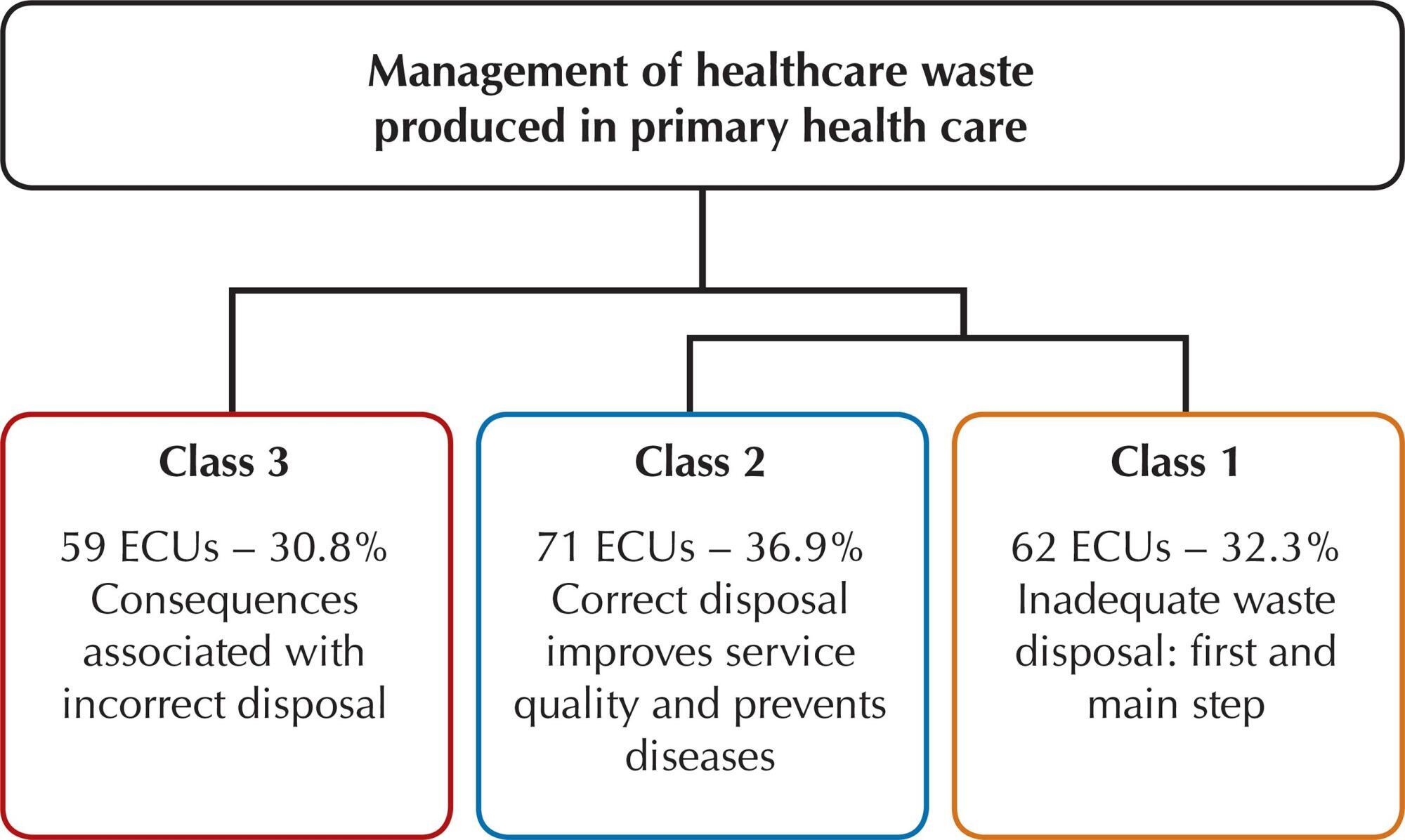
-
PESQUISA01/01/2018
Between State, society and family: the care of female caregivers
Revista Brasileira de Enfermagem. 2018;71:2720-2727
Resumen
PESQUISABetween State, society and family: the care of female caregivers
Revista Brasileira de Enfermagem. 2018;71:2720-2727
DOI 10.1590/0034-7167-2018-0111
Visualizações0Ver maisABSTRACT
Objective:
to investigate the care provided by family female caregivers of elderly dependents who have been monitored by public home care and its social repercussions, discussing the facets between State, society and families.
Method:
descriptive cross-sectional study, with 45 caregivers of elderly patients accompanied by Home Care Services. Data were collected by means of a structured script. The discussion was elaborated in light of the works «Cuidado e cuidadoras: as várias faces do trabalho do ‘care'» (Care and female caregivers: the several faces of the care work) and «Gênero e trabalho na França e no Brasil» (Gender and work in France and Brazil).
Results:
Most caregivers were women (95%) who performed home care at several places and incorporated hospital equipment into everyday life. They have been caregivers for four and a half years, working 18 hours a day on average; they presented average age of 55 years; 82% were ill, and 43% had no income.
Conclusion:
the study demonstrated the relevance of the care of female caregivers to society as well as their invisibility to public health and social policies.
-
PESQUISA01/01/2018
Quality of Primary Health Care in Brazil: patients’view
Revista Brasileira de Enfermagem. 2018;71:2713-2719
Resumen
PESQUISAQuality of Primary Health Care in Brazil: patients’view
Revista Brasileira de Enfermagem. 2018;71:2713-2719
DOI 10.1590/0034-7167-2017-0656
Visualizações0Ver maisABSTRACT
Objective:
To describe the evaluation of patients that participated in the National Program for Improving the Access and Quality in Primary Health Care (Programa Nacional de Melhoria do Acesso e da Qualidade na Atenção Básica) for the comprehensive healthcare, the bond and the coordination of care in the country’s macro-regions.
Method:
A descriptive, transversal study, from interviews with 65,391 patients of Primary Health Care, in 3,944 municipalities regarding the use of health services.
Results:
The professionals seek to solve the patients’ problems in their unit (73.1%) but focused mainly on the scope of the appointment (65.6%) and offering care away from the population’s reality (69.4%). Difficulties in the rescue of clinical history were referred (50.3%) and in the care performed in other health services (29.2%).
Conclusion:
The comprehensive health care, the bond and the coordination of care remain challenges to the Primary Health Care in the country, requiring reflections on the implementation of national policies, especially considering the regional diversities in Brazil.
-
PESQUISA01/01/2018
Role-playing: teaching strategy that encourages reflections on nursing care
Revista Brasileira de Enfermagem. 2018;71:2706-2712
Resumen
PESQUISARole-playing: teaching strategy that encourages reflections on nursing care
Revista Brasileira de Enfermagem. 2018;71:2706-2712
DOI 10.1590/0034-7167-2017-0733
Visualizações0Ver maisABSTRACT
Objective:
Describe the reflections of nursing students on nursing care through the use of role-playing.
Method:
Qualitative research with descriptive-exploratory approach and documentary base. The data were collected from portfolios of 32 students from an undergraduate course in the Southern Brazil. The analysis of the data followed the steps of sorting, classification in structures of relevance, synthesis and interpretation.
Results:
Two empirical categories were obtained: (1) Feelings in the act of taking care and receiving care and (2) Reversing roles: benefits to the nurse in the act of caring.
Final considerations:
The use of role-playing as a strategy for teaching the theme of care to undergraduate students encouraged reflections about the skills and abilities necessary for the act of taking care and favored the students’ self-perception as nurses, appropriating the essence of their future profession: care.
-
ARTÍCULO ORIGINAL08/12/2023
Simulation-based training in Leprosy: development and validation of a scenario for community health workers
Revista Brasileira de Enfermagem. 2023;76:e20230114
Resumen
ARTÍCULO ORIGINALSimulation-based training in Leprosy: development and validation of a scenario for community health workers
Revista Brasileira de Enfermagem. 2023;76:e20230114
DOI 10.1590/0034-7167-2023-0114
Visualizações0Ver maisABSTRACT
Objectives:
To build and validate a clinical simulation scenario designed to instruct community health workers (CHWs) in active leprosy case detection.
Methods:
Methodological study involving the development of a simulated clinical scenario and content validation by experts. The Content Validity Index (CVI) was used to determine the level of agreement among the judging commitee, and a descriptive analysis of their recommendations was performed.
Results:
A simulated scenario with a simulated participant was developed — a simulation characterized by low complexity, moderate physical/environmental fidelity, moderate to high psychological fidelity, and high conceptual fidelity, lasting 50 minutes and capable of training up to 10 CHWs simultaneously. The scenario was validated by 14 experts, with a CVI exceeding 80% for all components.
Conclusions:
The validated clinical simulation possesses attributes that make it highly reproducible in various national health contexts, thereby contributing to the global “Towards Zero Leprosy” strategy.
-
ARTÍCULO ORIGINAL08/12/2023
Knowledge and practices about health among Quilombola men: contributions to health care
Revista Brasileira de Enfermagem. 2023;76:e20230138
Resumen
ARTÍCULO ORIGINALKnowledge and practices about health among Quilombola men: contributions to health care
Revista Brasileira de Enfermagem. 2023;76:e20230138
DOI 10.1590/0034-7167-2023-0138
Visualizações1Ver maisABSTRACT
Objective:
to analyze health knowledge and practices among Quilombola men.
Methods:
a qualitative, descriptive study, carried out with 40 men from two Quilombola communities in Santa Izabel do Pará, state of Pará, Brazil. Individual interviews were carried out using a semi-structured script. Text corpus was subjected to analysis with Interface de R pour les Analyses Multidimensionnelles de Textes et de Questionnaires 0.6, alpha 3, through Descending Hierarchical Classification.
Results:
among participants, eight (20.00%) were aged 55 to 59 years. 382 text segments were identified, with 299 (78.27%) being used, generating five lexical classes, which made up two subcorpora. The classes were organized into four thematic axes, covering knowledge about health and practices to prevent and solve health problems.
Final considerations:
men highlighted popular/traditional wisdom permeated by biomedical knowledge, translating their understanding of how to act to remain or become healthy.

-
ARTÍCULO ORIGINAL06/10/2023
Ethical problems in nursing teleconsultations for people living with HIV during the Covid-19 pandemic
Revista Brasileira de Enfermagem. 2023;76:e20220754
Resumen
ARTÍCULO ORIGINALEthical problems in nursing teleconsultations for people living with HIV during the Covid-19 pandemic
Revista Brasileira de Enfermagem. 2023;76:e20220754
DOI 10.1590/0034-7167-2022-0754
Visualizações0Ver maisABSTRACT
Objectives:
to understand the ethical problems experienced by primary health care nurses in using nursing teleconsultations for people living with the human immunodeficiency virus during the coronavirus pandemic.
Methods:
qualitative research, anchored in Constructivist Grounded Theory. Data was collected between July and September 2020, with 17 participants.
Results:
the first category highlights the ethical problems in conducting teleconsultations, managing high demand, communication barriers, and risks related to data security. The second emphasizes the potential of teleconsultations in communication and access, by generating changes in the work process and the use of protocols to guide clinical practice.
Conclusions:
nurses’ work in digital mode requires professional qualification, with a view to stimulating reflection on teleconsultation practice, ethical-moral deliberation and combating stigma, and also adopting data security-centered conduct.
-
04/12/2023
Ethical dilemmas at the end of life: a reflection from the Philosophical Perspective of Luigina Mortari
Revista Brasileira de Enfermagem. 2023;76:e20220759
Resumen
Ethical dilemmas at the end of life: a reflection from the Philosophical Perspective of Luigina Mortari
Revista Brasileira de Enfermagem. 2023;76:e20220759
DOI 10.1590/0034-7167-2022-0759
Visualizações0Ver maisABSTRACT
Objectives:
to reflect on the ethical dilemmas involved in the care of patients at the end of their lives.
Methods:
this is a theoretical-reflective study based on the ethics of care proposed by Luigina Mortari.
Results:
discussing care involves addressing the ways of being inherent to human existence and understanding the unique characteristics of this condition. Ethical care constitutes an action driven by interest in the other and by the perception of their need. Ethical dilemmas are a part of end-of-life care, making it essential to maintain respectful assistance that considers the patient’s autonomy, using strategies for expressing their wishes, and ensuring continuous clear and empathetic communication among all those involved in providing care.
Final Considerations:
issues related to being, stemming from one’s reality of dependency and vulnerability, contribute to the emergence of ethical dilemmas present in care actions.
-
ARTÍCULO ORIGINAL04/12/2023
Overview of nursing ethics teaching in Brazilian public higher education institutions
Revista Brasileira de Enfermagem. 2023;76:e20220808
Resumen
ARTÍCULO ORIGINALOverview of nursing ethics teaching in Brazilian public higher education institutions
Revista Brasileira de Enfermagem. 2023;76:e20220808
DOI 10.1590/0034-7167-2022-0808
Visualizações0Ver maisABSTRACT
Objectives:
to outline the teaching of ethics in undergraduate Nursing programs in Brazilian public higher education institutions.
Methods:
descriptive and exploratory study, carried out through the documentary analysis of pedagogical projects of undergraduate Nursing programs in Brazil.
Results:
153 active undergraduate Nursing programs were found, of which 106 provide the pedagogical project. In addition to deontological teaching, the teaching of ethics was identified in a transversal way associated with themes such as Social Context, Hospital and Community Care, Pharmacology, Systematization of Nursing Care, Surgical Nursing, Epidemiology, Palliative Care, Management in Nursing, Diversity, Women’s, Children’s, Adolescent’s, Adult’s and Older People’s Health, and Mental Health.
Final Considerations:
the challenge in teaching nursing ethics is its integration with each action of caring, teaching and managing.

-
ARTÍCULO ORIGINAL08/12/2023
Validation of telesimulation in the care of late preterm newborns with hypoglycemia for nursing students
Revista Brasileira de Enfermagem. 2023;76:20220438
Resumen
ARTÍCULO ORIGINALValidation of telesimulation in the care of late preterm newborns with hypoglycemia for nursing students
Revista Brasileira de Enfermagem. 2023;76:20220438
DOI 10.1590/0034-7167-2022-0438
Visualizações0Ver maisABSTRACT
Objective:
To develop and validate a telesimulation scenario for nursing students in the care of late preterm infants with hypoglycemia.
Methods:
A methodological study conducted between August 2021 and May 2022 in a virtual environment involved constructing and validating the scenario with 10 experts, and testing it with 10 students. The content validity index assessed validity, with a threshold of 80% or higher, and suggestions were analyzed using semantic approximation.
Results:
Validation confirmed the appropriateness of all 14 scenario items, with an overall index of 97.8% and clarity and relevance indices of 98.5%. During testing, the overall index was 99.7%, with the “resources” item receiving the lowest score. Adjustments were made to objectives, technical terms, resources, and target audience based on feedback.
Conclusion:
Telesimulation is a widely accepted educational technology for training nursing students, with potential to enhance teaching quality and neonatal care.
-
ARTÍCULO ORIGINAL10/11/2023
Construction and validity of educational technology in audiovisual media on premature newborn care
Revista Brasileira de Enfermagem. 2023;76:e20220403
Resumen
ARTÍCULO ORIGINALConstruction and validity of educational technology in audiovisual media on premature newborn care
Revista Brasileira de Enfermagem. 2023;76:e20220403
DOI 10.1590/0034-7167-2022-0403
Visualizações0Ver maisABSTRACT
Objectives:
to construct and validate an educational video storyboard about care for premature newborns at home.
Methods:
a methodological study, with the construction of an educational video storyboard, validated with 14 judges. Content was selected from scoping review. For data collection, a validated instrument was used. The criterion for validity was agreement greater than 80%, analyzed using the Content Validity Index.
Results:
the storyboard construction was guided by the Cognitive Theory of Multimedia Learning theoretical framework. Construction and validity took place from May to December 2020. The storyboard’s final version lasted 10 minutes, and was validated in terms of objective, structure, presentation and relevance, with a Content Validity Index of 0.9.
Conclusions:
the storyboard of the educational video proved to be valid and adequate for health promotion in developing care for premature newborns at home.

-
ARTÍCULO ORIGINAL08/12/2023
Efecto de la deambulación temprana y la terapia dhikr en el movimiento peristáltico de pacientes sometidos a colecistectomía abierta
Revista Brasileira de Enfermagem. 2023;76:e20220636
Resumen
ARTÍCULO ORIGINALEfecto de la deambulación temprana y la terapia dhikr en el movimiento peristáltico de pacientes sometidos a colecistectomía abierta
Revista Brasileira de Enfermagem. 2023;76:e20220636
DOI 10.1590/0034-7167-2022-0636
Visualizações1RESUMEN
Objetivos:
analizar y determinar el efecto de una intervención que combinó la deambulación temprana y la terapia dhikr sobre la recuperación peristáltica intestinal de pacientes sometidos a colecistectomía abierta.
Métodos:
se utilizó un diseño preexperimental con un grupo pretest y postest. Las muestras incluyeron 15 pacientes sometidos a colecistectomía abierta y seleccionados mediante muestreo intencional. Los datos se recopilaron por medio de fichas de observación del instrumento y se analizaron mediante la prueba de Wilcoxon. La deambulación temprana utilizó el procedimiento operativo estándar en el hospital y la terapia dhikr se realizó durante 10 a 15 minutos, dos horas después de la operación.
Resultados:
la deambulación temprana asociada con la terapia dhikr afectó la recuperación peristáltica intestinal de los pacientes que se sometieron a colecistectomía abierta con anestesia general (Z =-3,442; p=0,001).
Conclusiones:
la combinación de la deambulación temprana con la terapia dhikr puede recomendarse como una intervención para mejorar el movimiento peristáltico intestinal de los pacientes después de una colecistectomía abierta con anestesia general.
Palavras-chave: Anestesia GeneralColecistectomiaDeambulación TempranaEnfermería PerioperatoriaTerapias ComplementariasVer mais
-
14/04/2021
Child behavior during the social distancing in the COVID-19 pandemic
Revista Brasileira de Enfermagem. 2021;74:e20200762
Resumen
Child behavior during the social distancing in the COVID-19 pandemic
Revista Brasileira de Enfermagem. 2021;74:e20200762
DOI 10.1590/0034-7167-2020-0762
Visualizações0Ver maisABSTRACT
Objective:
To describe the daily activities performed by children from 6 to 12 years of age incomplete and analyze children’s behavior during social distancing in the face of the COVID-19 pandemic.
Methods:
Cross-sectional study with children in a learning stage living in Brazil. The data were collected via online form. Fisher’s exact test was applied to analyze the association of categorical variables with child behavior; when significant, it was used the odds ratio. It was considered results considered statistically significant those presenting values of p < 0.05.
Results:
Data from 530 children were analyzed: 50.3% female, 71.3% from the Southeast Region, 73% in fulltime social distancing, 52% presented anxiety, which was significantly associated with changes in sleep and appetite.
Conclusion:
The results indicate the need for parents/caretakers to stimulate moments for the child to express themselves, not minimizing their feelings and providing emotional support to mitigate the negative impact of these feelings on the child’s mental and physical health.
-
05/12/2019
Hospital care and urinary incontinence in the elderly
Revista Brasileira de Enfermagem. 2019;72:284-293
Resumen
Hospital care and urinary incontinence in the elderly
Revista Brasileira de Enfermagem. 2019;72:284-293
DOI 10.1590/0034-7167-2018-0273
Visualizações0Ver maisABSTRACT
Objective:
to identify factors inherent in hospital care that favor urinary incontinence in the elderly.
Method:
an integrative review with Scopus, CINAHL and Pubmed searches. Includes original articles, no language restriction, published between 2008 and 2018. Rated level of recommendation and level of evidence were assessed using the Oxford Center for Evidence-Based Medicine classification. Exploited content through thematic analysis in light of the Donabedian model.
Results:
13 articles constituted the sample. There were factors such as the unjustified and indiscriminate use of devices such as the geriatric diaper; hospital structure adversely affecting the needs of the elderly; and deficit in screening, risk identification and underreporting of the problem favor urinary incontinence in the hospitalized elderly.
Conclusion:
modifiable factors related to hospital structures and care processes favor both the onset and worsening of urinary incontinence in the elderly.
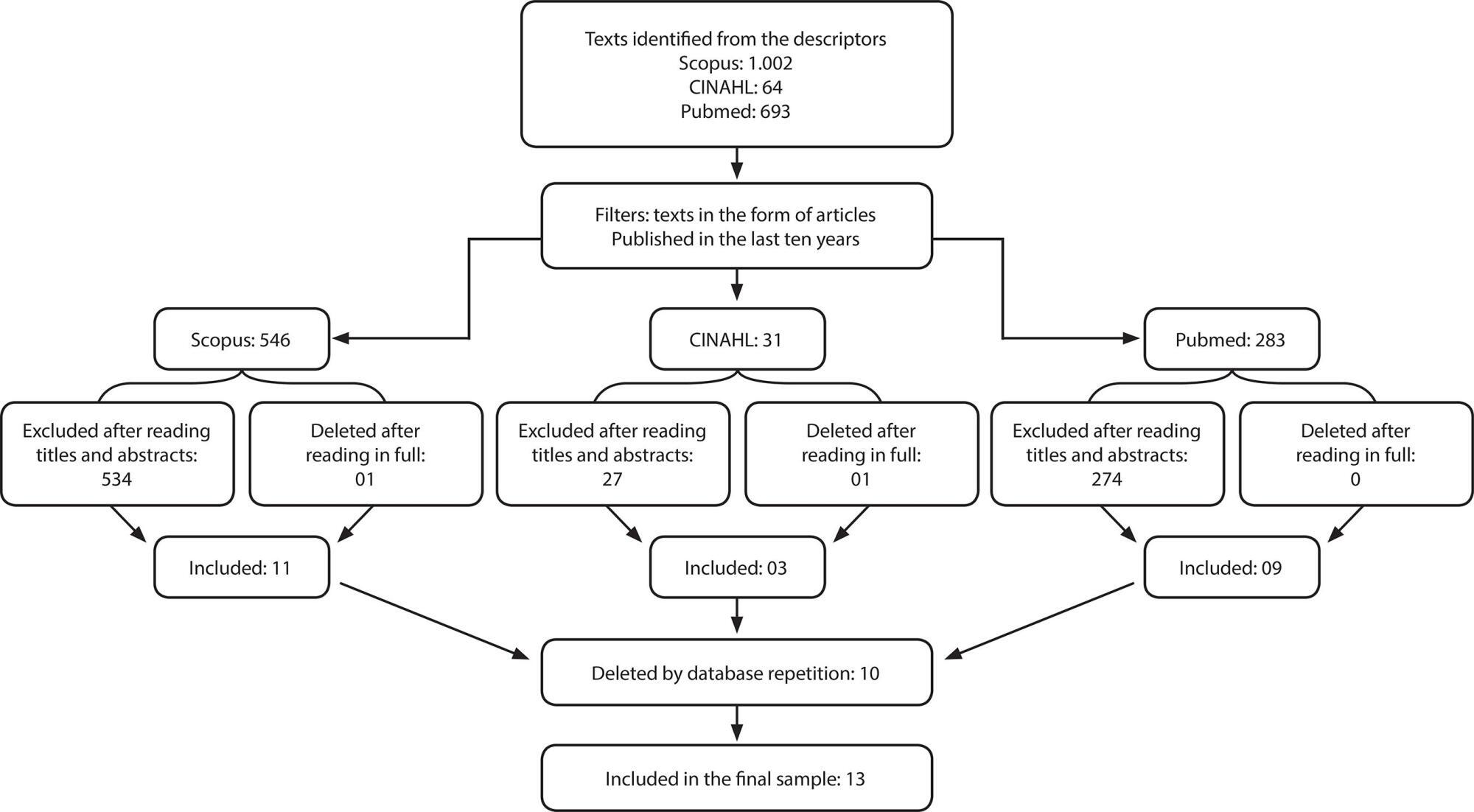
-
ARTÍCULO ORIGINAL21/10/2019
Hipermídia educativa sobre assistência de enfermagem ao parto: construção e validação de conteúdo e aparência
Revista Brasileira de Enfermagem. 2019;72(6):1471-1478
Resumen
ARTÍCULO ORIGINALHipermídia educativa sobre assistência de enfermagem ao parto: construção e validação de conteúdo e aparência
Revista Brasileira de Enfermagem. 2019;72(6):1471-1478
DOI 10.1590/0034-7167/2018-0163
Visualizações1Ver maisRESUMO
Objetivo:
construir uma hipermídia educativa sobre a assistência de enfermagem ao parto de risco habitual e realizar a validação de conteúdo e de aparência.
Método:
pesquisa metodológica, realizada seguindo as seguintes etapas: levantamento do conteúdo e planejamento dos módulos; produção das mídias e organização das unidades tutoriais; organização do espaço do aluno, tutor e de comunicação entre eles; elaboração da hipermídia; disponibilização da hipermídia; avaliação por especialistas em Enfermagem e Informática; e implementação das sugestões propostas.
Resultados:
a hipermídia educativa mostrou-se como um material validado, visto que apresentou um ótimo índice de validade de conteúdo global de 0,97 e significância estatística no teste binomial para o conteúdo e aparência.
Conclusão:
acredita-se que o uso deste material com alunos da graduação em Enfermagem contribuirá com a qualidade da assistência obstétrica, tendo em vista que se constitui em uma tecnologia ilustrada capaz de favorecer o ensino-aprendizagem sobre parto normal humanizado.
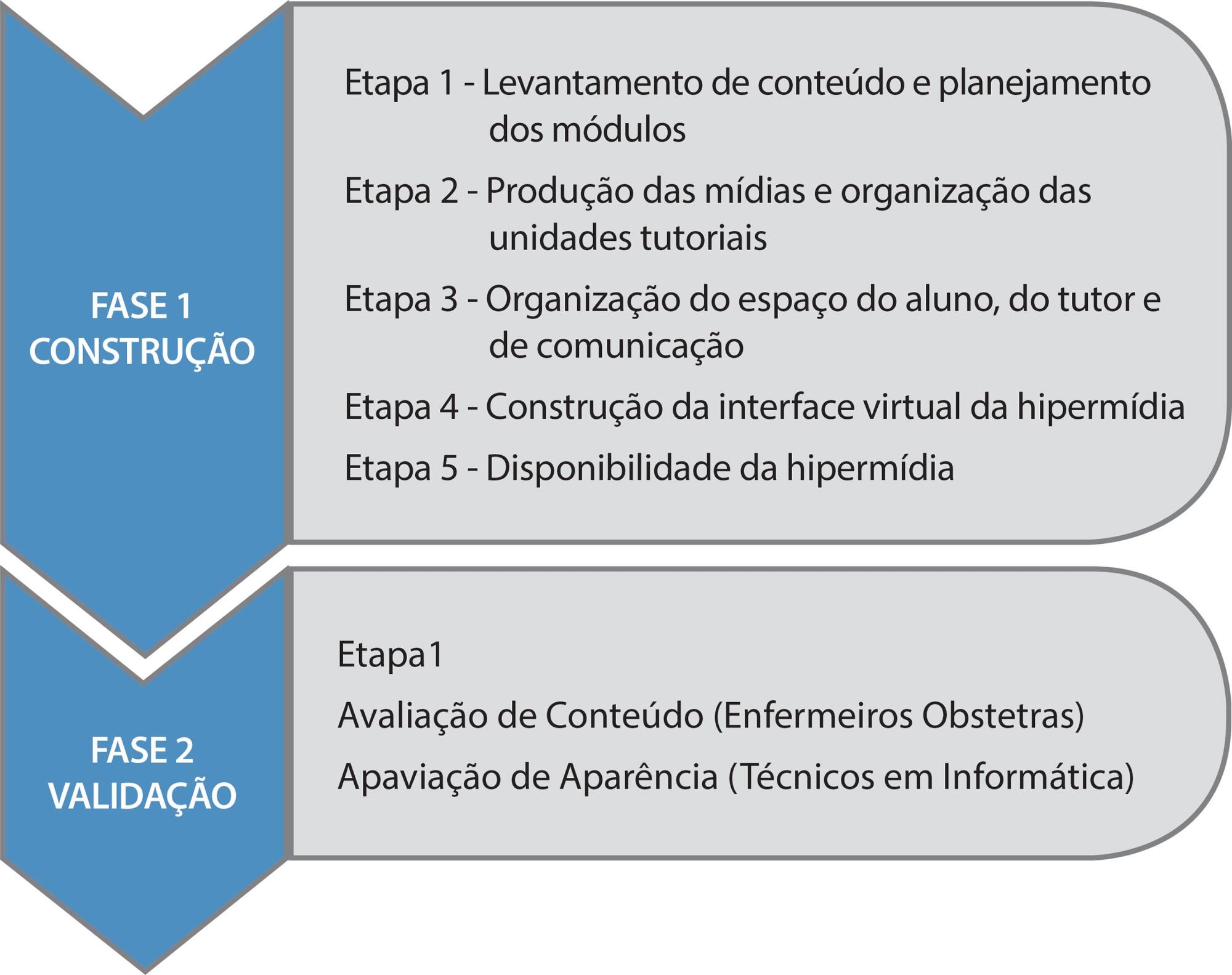
-
ARTÍCULO ORIGINAL30/03/2020
Boas Práticas de segurança nos cuidados de enfermagem em Terapia Intensiva Neonatal
Revista Brasileira de Enfermagem. 2020;73(2):e20180482
Resumen
ARTÍCULO ORIGINALBoas Práticas de segurança nos cuidados de enfermagem em Terapia Intensiva Neonatal
Revista Brasileira de Enfermagem. 2020;73(2):e20180482
DOI 10.1590/0034-7167-2018-0482
Visualizações0RESUMO
Objetivos:
identificar a percepção dos profissionais de enfermagem sobre o erro humano nos cuidados de enfermagem na Unidade de Terapia Intensiva Neonatal; analisar as estratégias de Boas Práticas propostas por esses profissionais para a segurança do paciente nos cuidados de enfermagem.
Métodos:
estudo quanti-qualitativo, descritivo. Cenário: Unidade de Terapia Intensiva Neonatal. Participantes: 22 profissionais de enfermagem. Coleta dos dados realizada por meio de entrevistas e submetidos a análise temática.
Resultados:
erro humano nos cuidados de enfermagem, identificando-se perdas de cateteres e erros no processo de medicação; causas para o erro nos cuidados de enfermagem, destacando-se a sobrecarga de trabalho; Boas Práticas para a segurança do paciente nos cuidados de enfermagem, como capacitação profissional e melhorias das condições de trabalho.
Conclusões:
demonstra-se a importância de investir em estratégias de Boas Práticas para a Segurança do Paciente, buscando-se sedimentar a cultura de segurança organizacional e estimular um ambiente propício ao gerenciamento do erro.
Palavras-chave: EnfermagemErros MédicosGestão de SegurançaSegurança do PacienteUnidades de Terapia Intensiva NeonatalVer mais -
ARTÍCULO DE REVISIÓN29/09/2022
Nursing students’ learning from involvement in research projects: an integrative literature review
Revista Brasileira de Enfermagem. 2022;75(1):e20210053
Resumen
ARTÍCULO DE REVISIÓNNursing students’ learning from involvement in research projects: an integrative literature review
Revista Brasileira de Enfermagem. 2022;75(1):e20210053
DOI 10.1590/0034-7167-2021-0053
Visualizações0Ver maisABSTRACT
Objective:
To identify the learning outcomes and skills obtained of undergraduate nursing students involved in research projects.
Methods:
This was an integrative literature review, based on a research protocol in the CINAHL Complete databases; Cochrane Central Register of Controlled Trials; Cochrane Database of Systematic Reviews; Cochrane Methodology Register; MedicLatina; MEDLINE, Scopus and JBI, including primary and secondary studies, published between 2015 and 2020.
Results:
A total of five heterogeneous articles were included, which were categorized using Kirkpatrick’s (adapted) model. Seventeen learning outcomes acquired through participation in research projects were identified, from the learning of new knowledge and skills to the development of new attitudes and behaviors.
Final considerations:
The involvement of nursing students in research projects is important to their professional development. Future investment in research on this topic can help cement the potential of this type of student involvement.
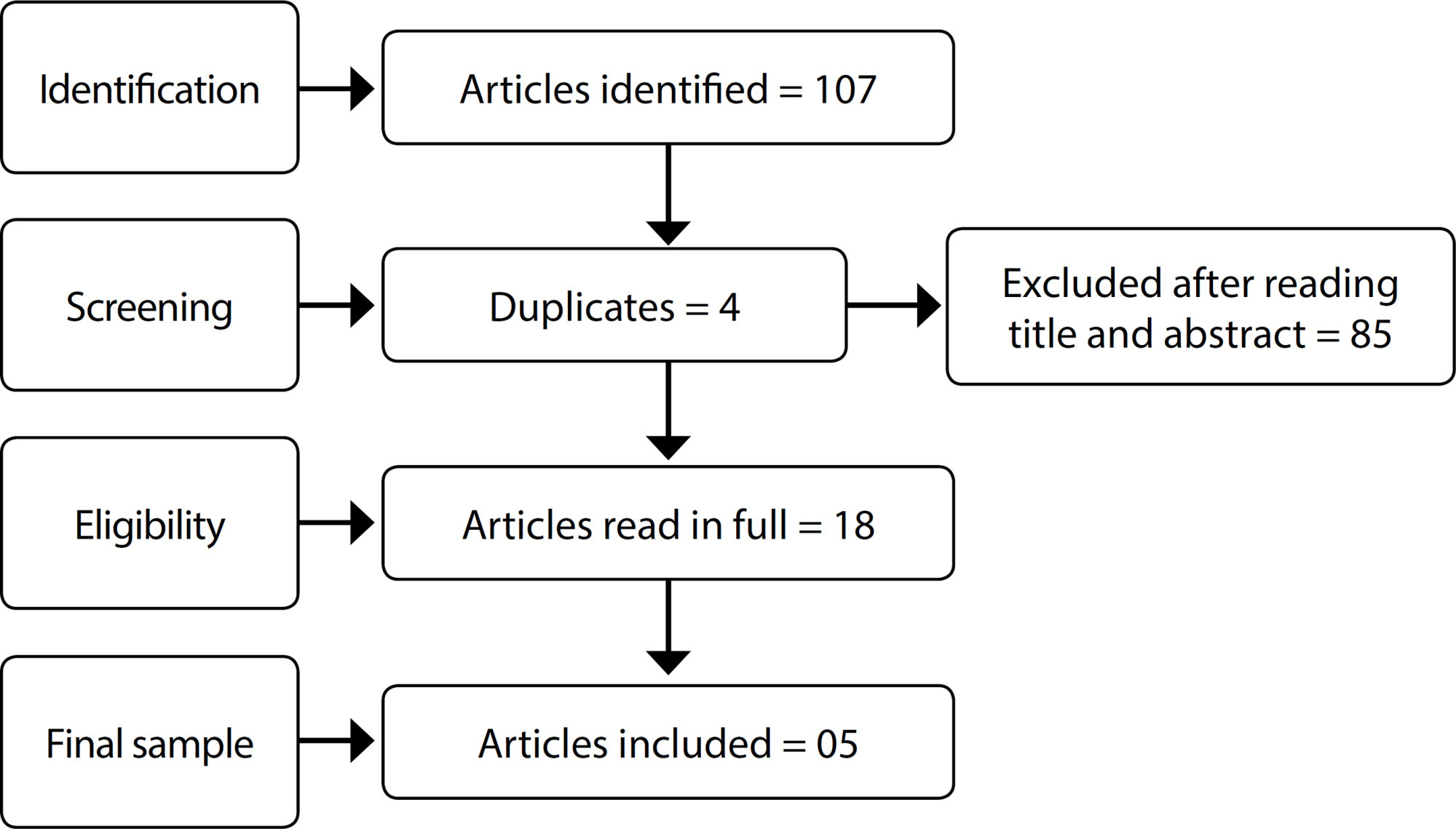
-
ARTÍCULO ORIGINAL05/12/2019
Qualidade de vida relacionada à saúde em pacientes com insuficiência cardíaca
Revista Brasileira de Enfermagem. 2019;72:140-146
Resumen
ARTÍCULO ORIGINALQualidade de vida relacionada à saúde em pacientes com insuficiência cardíaca
Revista Brasileira de Enfermagem. 2019;72:140-146
DOI 10.1590/0034-7167-2018-0368
Visualizações1RESUMO
Objetivo:
Avaliar a qualidade de vida relacionada à saúde dos pacientes com insuficiência cardíaca e relacionar aos dados sociodemográficos e clínicos.
Método:
Trata-se de estudo observacional, de corte transversal, com abordagem quantitativa realizado em ambulatório de insuficiência cardíaca no estado de Pernambuco.
Resultados:
Na amostra (n=101) houve predominância de homens, maiores de 60 anos, casados, profissionalmente inativos. A qualidade de vida relacionada à saúde, a partir do questionário Minnesota Living With Heart Failure Questionnaire foi considerada moderada (34,3±21,6), apresentando relação significativa com idade (p=0,004), classe funcional (p<0,001) e em pacientes com cardiopatia chagásica (p=0,02).
Conclusão:
A qualidade de vida no grupo IC de etiologia chagásica esteve mais comprometida, especialmente na dimensão emocional. Sugere-se a realização de estudos abordando as hipóteses de que maior tempo de acompanhamento ambulatorial melhora a qualidade de vida e que ter doença de Chagas interfere negativamente na qualidade de vida de pacientes com insuficiência cardíaca.
Palavras-chave: Assistência AmbulatorialDoença de ChagasEnfermagemInsuficiência CardíacaQualidade de VidaVer mais -
ARTÍCULO DE REVISIÓN21/12/2020
Aplicação da metodologia Lean Seis Sigma nos cenários de assistência à saúde: revisão integrativa
Revista Brasileira de Enfermagem. 2020;73:e20190861
Resumen
ARTÍCULO DE REVISIÓNAplicação da metodologia Lean Seis Sigma nos cenários de assistência à saúde: revisão integrativa
Revista Brasileira de Enfermagem. 2020;73:e20190861
DOI 10.1590/0034-7167-2019-0861
Visualizações0RESUMO
Objetivo:
analisar a produção científica sobre os resultados da metodologia Lean Six Sigma nas instituições de assistência à saúde.
Métodos:
revisão integrativa da literatura, com a seguinte pergunta: quais são os resultados nas instituições de saúde com a utilização da metodologia Lean Six Sigma e Six Sigma? A busca foi realizada nas bases de dados MEDLINE, LILACS, BDENF, CINAHL, Web of Science e Scopus, sem recorte temporal.
Resultados:
foram incluídos 34 artigos, publicados entre 2005 e 2019, sendo 52,9% provenientes dos Estados Unidos da América. As melhorias mais comumente encontradas foram em instituições hospitalares e na perspectiva dos clientes e processos internos.
Conclusão:
a utilização da metodologia Lean Six Sigma se demonstrou eficaz nos diversos cenários de assistência à saúde, se destacando uma lacuna em sua aplicação quanto ao engajamento e capacitação de pessoas.
Palavras-chave: Administração em SaúdeAssistência à SaúdeControle de QualidadeGestão da Qualidade TotalMelhoria de QualidadeVer mais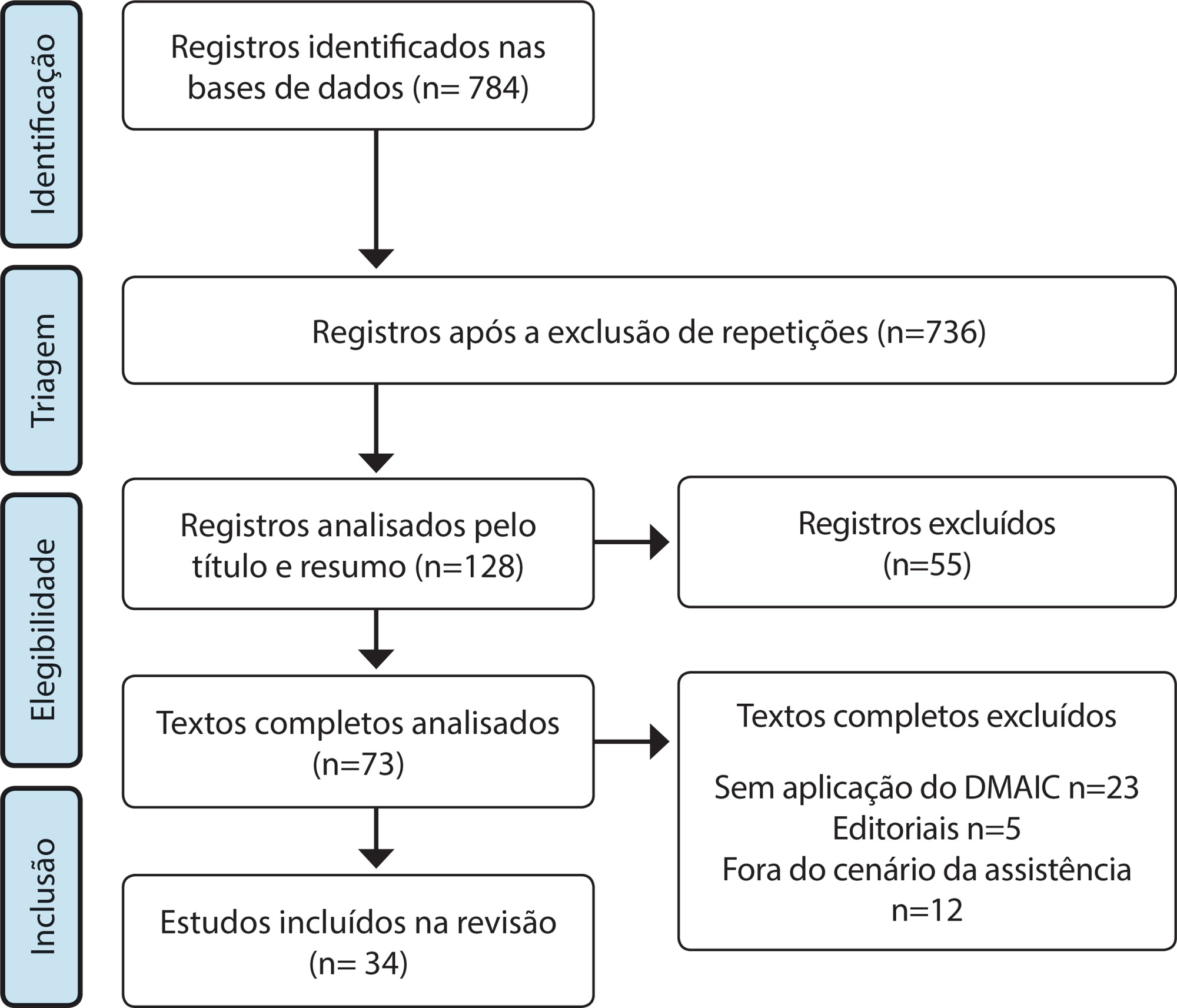
-
ARTÍCULO ORIGINAL17/02/2020
Análise dos registros de técnicos de enfermagem e enfermeiros em prontuários
Revista Brasileira de Enfermagem. 2020;73(2):e20180542
Resumen
ARTÍCULO ORIGINALAnálise dos registros de técnicos de enfermagem e enfermeiros em prontuários
Revista Brasileira de Enfermagem. 2020;73(2):e20180542
DOI 10.1590/0034-7167-2018-0542
Visualizações0RESUMO
Objetivos:
analisar as principais não conformidades dos registros de enfermagem de um hospital público do Nordeste na cidade de Natal.
Métodos:
estudo descritivo, transversal, abordagem quantitativa. Realizado em enfermarias médicas e cirúrgicas. Amostra composta de 120 prontuários de pacientes internados entre outubro e dezembro de 2016. Os dados obtidos foram tabulados e analisados por estatística simples em frequência absoluta e relativa com o software Microsoft Excel 2013. Para avaliar as não conformidades dos registros, usou-se o Diagrama de Pareto.
Resultados:
como principais problemas nos registros de enfermagem, destacou-se a ausência da categoria profissional e número do conselho, responsáveis por 41,8% das não conformidades nos registros de técnicos de enfermagem, enquanto nas anotações dos enfermeiros foram a ausência de hora e as letras ilegíveis, com 61,2%.
Conclusões:
o estudo evidenciou que os profissionais de enfermagem realizam seus registros de forma incompleta e que muitas vezes não documentam o cuidado prestado.
Palavras-chave: ComunicaçãoEnfermagemPesquisa sobre Serviços de SaúdeRegistros de EnfermagemSegurança do PacienteVer mais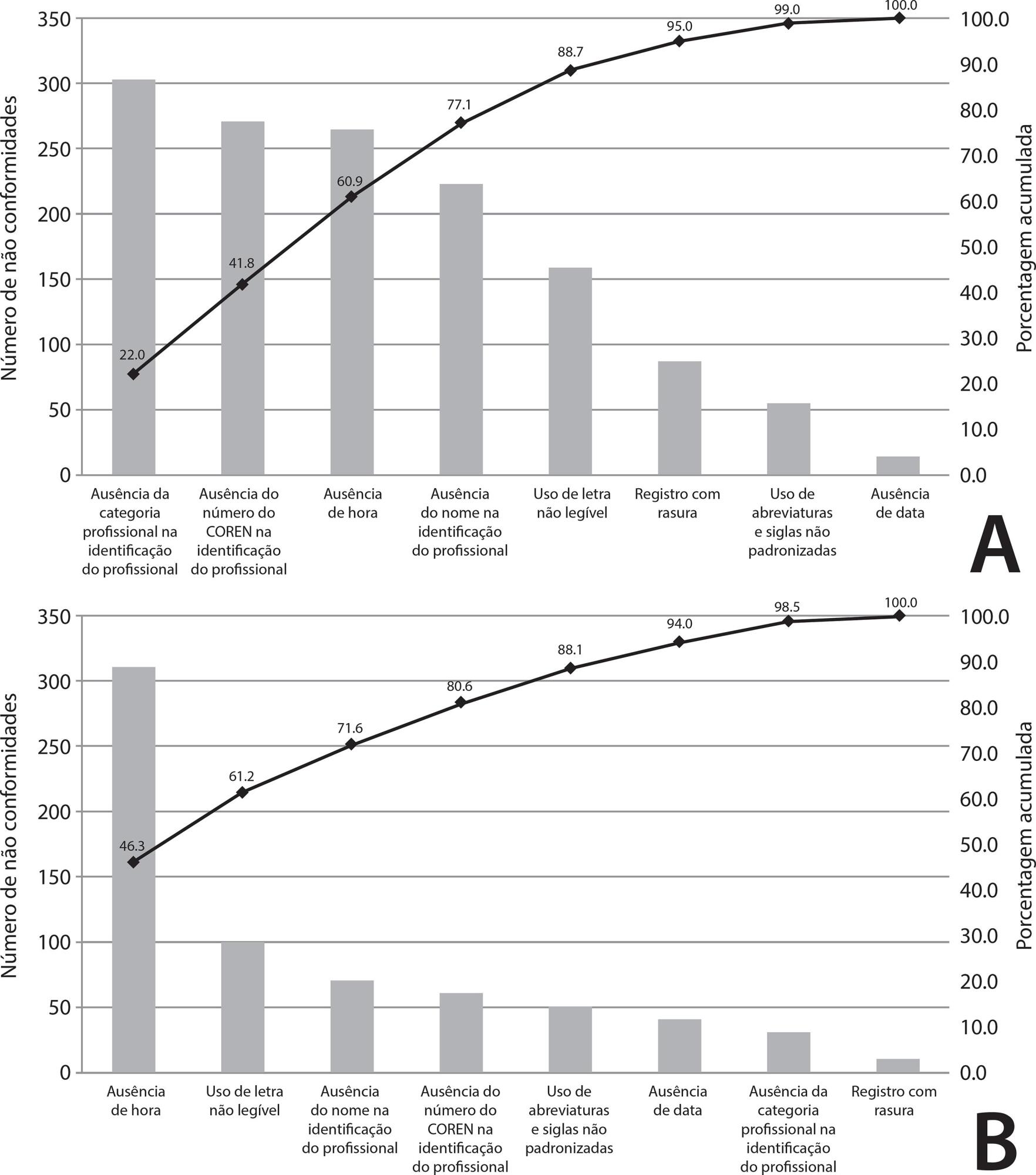
Búsqueda
Buscar en:
Nuvem de Tags
Adolescente (85) Atenção Primária à Saúde (239) COVID-19 (91) Criança (91) Cuidados de Enfermagem (269) Educação em Enfermagem (151) Educação em Saúde (139) Enfermagem (930) Enfermagem Pediátrica (86) Estudantes de Enfermagem (77) Estudos de Validação (131) Família (87) Idoso (208) Promoção da Saúde (99) Qualidade de Vida (104) Saúde do Trabalhador (86) Saúde Mental (145) Saúde Pública (82) Segurança do Paciente (150) Tecnologia Educacional (100)



